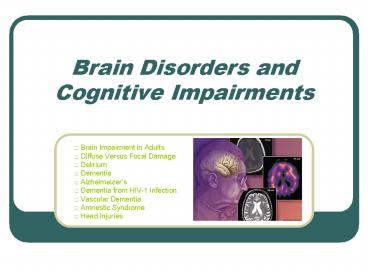Brain Disorders and Cognitive Impairments - PowerPoint PPT Presentation
1 / 20
Title:
Brain Disorders and Cognitive Impairments
Description:
Disorders involving some kind of identifiable pathology. ... Which contain a sticky protein called beta amyloid. Neurofibrillary tangles ... – PowerPoint PPT presentation
Number of Views:35
Avg rating:3.0/5.0
Title: Brain Disorders and Cognitive Impairments
1
Brain Disorders and Cognitive Impairments
- Brain Impairment in Adults
- Diffuse Versus Focal Damage
- Delirium
- Dementia
- Alzheimeizers
- Dementia from HIV-1 Infection
- Vascular Dementia
- Amnestic Syndrome
- Head Injuries
2
Cognitive Impairments
- Prior to the DSM-IV
- Disorders involving some kind of identifiable
pathology. - Ex brain tumor, stroke, drug intoxication
- Were labeled organic mental disorders.
- Functional mental disorders were considered not
to have an organic basis.
3
Brain Impairment in Adults
- Mini-Mental State Examination
- Orientation (Where are we now?)
- Registration (Repeat these three words.)
- Attention and concentration (Count backwards by
seven.) - Recall (Do you remember those three words?)
- Language (Name what Im pointing to.)
- Comprehension (Pick up the paper in front of
you.) - Construction ability (Copy this design.)
4
Diffuse Versus Focal Damage
- Diffuse Damage
- Damage that involves more than one area of the
brain. - Attention is often impaired.
- Damage from moderate oxygen deprivation.
- Ex. Concussion
- Focal Damage
- Damage to one area of the brain.
- Can cause different problems depending on what
part of the brain is affected. - Damage from an injury or stroke.
5
(No Transcript)
6
Diffuse Versus Focal Damage
- Some consequences of brain disorders that have
mainly focal origins but commonly appear in the
context of progressively diffuse damage are as
follows - Impairment of memory
- Impairment of orientation
- Impairment of learning,
- comprehension, and judgment
- Impairment of emotional control or
- modulation
7
Diffuse Versus Focal Damage
- Some consequences of brain disorders that have
mainly focal origins but commonly appear in the
context of progressively diffuse damage are as
follows - Apathy or emotional blunting
- Impairment in the initiation of behavior
- Impairment of controls over matters of propriety
and ethical conduct - Impairment of receptive and expressive
communication - Impaired visuospatial ability
8
Diffuse Versus Focal Damage
- There appears to be a close link between
neuropsychological and psychopathological
conditions. - It is erroneous to assume that a psychological
disorder is necessarily and completely explained
by the patients brain damage.
9
Delirium
- Commonly occurring syndrome.
- Acute confusional state that lies between normal
wakefulness and stupor or coma. - Has a sudden onset and involves a fluctuating
state of reduced awareness. - Reflects a major change in the way the brain is
working. - Can occur in a person of any age, though the
elderly are at particularly high risk.
10
Delirium
- May result from several conditions
- Head injury
- Infection
- Is most commonly caused by
- Drug intoxication
- Withdrawal
- Is a true medical emergency.
- Is often reversible.
- Is most often treated by
- Medications
- Environmental manipulations
- Family support
11
Dementia
- Is not a rapidly fluctuating condition.
- Is characterized by a decline from a previously
attained level of functioning. - Has a slow onset and a deteriorating course.
- Can be caused by over 50 different disorders.
- Is most commonly caused by Alzheimers disease.
12
Alzheimeizers Disease
- Alzheimers disease is associated with a
characteristic dementia syndrome that has - A very gradual and subtle onset.
- A usually slow but progressively deteriorating
course terminating in delirium and death.
13
Alzheimeizers Disease
- Age is a major risk factor.
- Genes play a major role in susceptibility.
- Genetic mutations of genes
- APP
- Presenilin 1
- Presenilin 2
- Presentation of
- APOE-4 allele of the APOE gene
14
Alzheimeizers Disease
- The characteristic neuropathology
- Cell loss
- Plaques
- Which contain a sticky protein called beta
amyloid. - Neurofibrillary tangles
- Which contain an abnormal tau protein.
15
Alzheimeizers Disease
- Causes the destruction of cells that make
aceytlcholine. - Neurotransmitter important for memory.
- Drug treatments include
- Cholinesterase inhibitors
- Donepezil
- These drugs help stop ACh from being broken down.
- Making more of it available to the brain.
16
Alzheimeizers Disease
- Any comprehensive approach to therapeutic
intervention must consider - Situation of caregivers.
17
Dementia from HIV-1 Infection
- The HIV-1 virus (or a mutant form of it) can
itself result in the destruction of brain cells. - Neuropsychological features include
- Mild memory difficulties
- Psychomotor slowing
- Diminished attention and concentration
- Somewhere between 30 and 60 of untreated
patients with HIV/AIDS will develop AIDS-related
dementia.
18
Vascular Dementia
- Series of circumscribed cerebral infarcts
cumulatively destroy neurons over expanding brain
regions. - Basically Blockages in the brains blood supply.
19
Amnestic Syndrome
- Characteristic feature
- Strikingly disturbed memory.
- Causes of amnestic syndrome include
- Chronic alcohol use
- Head trauma
- Stroke
- A wide range of techniques have been developed to
assist the good-prognosis amnestic patient in
remembering recent events.
20
Head Injuries
- Head injuries can cause
- Retrograde amnesia
- Anterograde amnesia
- Personality changes
- Prompt treatment of brain injury may prevent
further damage.































